- Home
- L. Ron Hubbard
Trouble on His Wings Page 4
Trouble on His Wings Read online
Page 4
“Ahead or behind?” said Irish.
“Ahead. Find a brook. Find anything.” Johnny’s hands were swiftly taking the load out of his camera, rolling it up and wrapping it up. He seemed to have no attention for anything else.
“There’s an open space!” yelled Irish. “Belt yourself down. This is going to be rough!”
“Throw your belt across you,” ordered Johnny, sinking into a chair and buckling his own.
She found that her hands were frozen. Somehow she managed to fasten the clasp. It was too loose for her and she glanced at Johnny. He was still wrapping up the film, using his own coat.
“Might get singed,” said Johnny, tapping the drum in his hand.
She had barely heard him when they struck. She didn’t know what happened. She lost a few seconds out of her life and knew nothing about them except that they had gone. She was sitting in her chair, but her weight was all against her side. In the angry red light which permeated the forest, she could see the trees, all horizontal about her. Hands grabbed her and jerked her out of the ship.
“Where’s a creek?” yelled Johnny.
“I saw something shiny over to the left!” yelped Irish.
She could hear a snarling, angry sound to the south and knew that it was the crown fire. Her legs failed her and Johnny scooped her up, running and stumbling through the grass, guided by Irish’s white jumper.
Deer, with death in their eyes, bounded through the clearing, failing to notice either humans or a terrified cougar that sped in their midst. Small animals, badgers, squirrels, chipmunks and a lumbering bear fled blindly from the greatest devourer of all—FIRE.
Johnny half-slipped, half-leaped down a clay bank. A beaver dam had crossed this creek in former years but, though its builders were dead, water still remained there, several feet deep. Into it plunged Irish, up to his waist, and then she saw that he gripped the big moving-picture camera in his arms. The whole world had slowed down for her. Animals in a steady stream cleared this creek and raced out of sight into the darkness beyond. A wise chipmunk plunged in. Against the scarlet sky she could see legions of birds striving to outstrip the smoke. There was something grandly beautiful in this drama of death and only the shock of the water broke her momentarily detached state.
Johnny had thrown her down. “Swim up under one of those mounds!” he cried. “There’s air in them. Gimme that camera, Irish.”
Into it plunged Irish, up to his waist, and then she saw that he gripped the big moving-picture camera in his arms.
“Gee whiz, this ought to wow ’em!” cried Irish, ducking into the pool.
“Lay ’em in the aisles!” cried Johnny, opening wide his lens. For a moment he was conscious of the smallness of his voice against that crackling roar which sped upon them and then he was again all business, wading into the pool until the water was up to his neck, holding the camera at face level. The tripod helped buoy it up. He reached over and snatched the helmet from the girl’s head, putting it on and drawing the goggles down.
They heard the plane catch fire. A moment later it exploded and then, after that, all the sky was alight. The crown fire, traveling with a plane’s speed, whooshed over them. But as an undertone, the girl could hear the steady whir of the camera, focused now upon the trapped animals, now up the scourged trees. Burning brands rained upon them, hissing as they struck the pool, setting fire to the brush on the banks. Johnny swore abruptly, but the whirring camera sound went on.
She was conscious that she held the film he had taken from the plane and knew she had been holding it up carefully for minutes. It surprised and pleased her to find that she had been calm all that time, despite the heat which penetrated the beaver mound.
Suddenly she heard Irish scream, “LOOK OUT!”
There came a long, groaning sigh, a swish of branches and then a numbing crash which sent the water over the mound in a great wave. Something struck the girl’s head and she fought to keep up above the surface but, gradually, she sank down.
She had no consciousness of being moved, but when she again opened her eyes, it was to behold Johnny’s blackened face. He had two white rings around his eyes where the goggles had been, and a long wet streak of red which worked slowly down his cheek. It was scorching hot and the world glowed redly, flickering from small flames which still licked the trunks of the dead forest giants. The pool was a dirty mess of floating charcoal and dead, small animals. A powdery ash was snowing around them, gently and quietly, throwing everything out of proportion for her.
“She’s alive!” said the singed Irish.
“Yeah,” said Johnny, hiding his own relief. It seemed funny to her that he should want to smoke with all this eddying about him, but he was lighting a cigarette. He sat down in the shallow water over the dam, remorsefully puffing as he stared at the devastation. She lifted herself up a little and saw that a great tree divided the pond. Others had fallen up stream and down, their roots already unstable in the soft earth and needing only the furious blast of the crown fire to knock them over. It had been this, then, which had struck her.
“Did you get the pictures?” she said, sitting up.
“The air shots are down there some place,” said Johnny, jerking the cigarette to indicate the bottom of the pool. “You dropped them when you went out. The camera is likewise in the drink, the whole top knocked out of it.”
“The tree didn’t hit you?”
“Missed me—a whole foot,” said Johnny.
“They’re all gone,” wept Irish, unashamed. “They’re all gone. And they was such swell pictures. Animals and the crown fire, and everything.”
“Can’t you salvage them?”
Johnny didn’t even bother to answer.
“But maybe just plain water—”
Irish moaned, “Please.”
Johnny touched his cheek and looked at his bloody fingers in some surprise, deciding he had better wash his face. He knelt down, dabbling in the water.
“It’s going to be a hot walk,” he said, “and maybe a damned long one.”
Irish recovered himself. He took out a pocket knife and approached a dead deer sprawled on the bank. The girl looked away, already too conscious of the smell of singed hair and burnt meat which hung over the world about them. However, a little later, when Irish finished roasting the steaks on a stump, she took her portion.
Johnny was looking at her critically as he ate.
“What’s the matter?” she said, acutely aware of her smudged face, torn clothes and wet hair.
“Lady,” he said slowly, “I hereby christen you ‘Jinx’.”
Jinx
Chapter Five
TWENTY tragic hours later, the scorched, ragged, blackened, wretched, hungry, weary, dispirited, footsore and homeless trio trudged into Coeur d’Alene’s best hotel, cast off by a Forest Service truck. For a long, long time it had been raining and the soot had clung to them, a black scum overlaid by gumbo.
The clerk was startled and then dismayed at the pools of black paint which were tracked across the floor—and though he was not at all haughty about costume, he considered this a shade too much for two men and a boy to so scandalously appear in his hotel. He drew himself up behind his desk. “I am very sorry but we have—”
“Skip it,” snarled Johnny, flashing a wallet with his World News card before the fellow’s face. “You’re giving us three connecting, your very best. Where’s your telephone?”
The clerk amended his first lack of hospitality. He called, “Front!” and a bellhop came forward, with misgivings about any tip. “Mr. Brice of World News,” said the clerk, “will occupy the governor’s suite. Here is the key. Will you go right up, sir? I could have some food sent to you in your room. You can use the phone there, and we have some haberdashers in Coeur d’Alene who are up to the minute. Were you filming the fire? Was it as bad as they say?”
“Send up the menu, three portions of everything,” said Johnny.
They got into the elevator and were taken to
the top floor. The boy was oblivious of their footprints on the carpets. His eyes were roundly fixed on Johnny, and he fell all over the rooms as he opened windows and made a pretense of checking the towels.
Johnny said, “Tell them to put a dollar on the bill. And get me some Scotch.”
“Oh, no, sir. I mean that’s all right about the dollar. I always wanted to be a cameraman. Do you suppose—”
“I said a bottle of Scotch,” said Johnny.
The boy, still goggle-eyed, retreated.
The girl sank spiritlessly into a chair, pulling off the helmet. Her hair had been protected and the bright honey-gold of it was in startling contrast to her black face.
Irish walked straight into one of the bathrooms and stepped under the shower without bothering to take off his clothes. A muddy Mississippi ran down the drain and his small bright face began to show through its camouflage.
Johnny threw his stained self down on the silken bedspread and wrapped his fingers around the phone. “Gimme New York, Bryant 9-3300. I’ll hold on.” He sat there listlessly, hearing the round whir of sound which shot his call through to Chicago, then to New York. He heard the buzz of the ringing at the office. “Felznick. This is Brice.” He got Felznick. “This is Johnny. I’m in Coeur d’Alene.”
“You got the pictures?” said Felznick eagerly. “One of them towns almost burned! Did you get it?”
“Sure I got it. I got everything. I got aerial shots at dusk, and then the engine choked, when the smoke got too much for the carburetor, and we smeared in right ahead of the crown fire.”
“You get the crash?” said Felznick eagerly.
“Sure. And then I got the animals heading out from the blaze, and then, with water up to my neck, I got the crown fire leaping over this creek we stumbled into.”
“Johnny, you are a genius! A genius! You can come back to New York. I raise your pay! I always said there never was such a cameraman . . .”
“Wait,” said Johnny. “A big tree, afire, fell down right across the pool and smashed the DeVry to smithereens and knocked out the . . . knocked the other can into the drink. I haven’t got a single shot, not even the remains of the burn.”
There was silence at the other end of the phone. And then there was a long, heartfelt sigh.
“I did my damndest,” said Johnny. “That was all I could do.”
“Brice,” said Felznick. “Brice, I am being calm. I am being very cool, Brice. I am not going to say more than this. . . .”
“I quit!” said Johnny.
“The hell you do!” screamed Felznick. “You’re fired! A twelve-thousand-dollar plane, and you lose your pictures! You’re fired. I never want to hear of you, see you, speak to you! Never! I won’t pay your bills! You can sue for your pay and to hell with you! Don’t ever come close to me again! Never!” There was a bang as he slammed the phone on the hook.
Johnny hung up slowly, looking at the girl. “How do you feel?”
She gave him a game grin. “Okay. A little hungry.”
“Eat hearty,” said Johnny. “This may be our last meal, and we may have to wash dishes for that.”
“You mean—”
“I’m fired. Irish is fired. We’re in the soup, Jinx.” He got up and walked into Irish’s bathroom, stepping over the edge of the tub and joining Irish under the shower. The lampblack fell from him in inky waterfalls. Irish sat on the edge of the tub, wringing the water out of his coveralls.
“We’re fired,” said Johnny.
Irish gave a start as though he’d been shot. His mouth hung open and he stared straight ahead. “Fired?”
“And no pay,” said Johnny.
“What’ll we do to pay our hotel bill?” gulped Irish.
“You figure it out.”
There came a knock on the door and the girl hastily put on her helmet and answered it. Three waiters began to move five tables, all snow-white-napkined and groaning with food, into the room. The bellhop had a stack of boxes in his arms.
“The haberdashers sent these up with their compliments,” said the bellhop. “Some silk bathrobes and stuff. Gee, I bet it was awful hot up at that fire.”
She didn’t dare speak and betray her woman’s voice and so she only smiled and happened to glance down. The bill was protruding from under a plate and the figure on it was so heavy it showed through the back. Thirty-nine dollars.
A waiter gravely took the slip and handed it to Johnny under the shower. Johnny signed it and the man withdrew.
“You got any money, Irish?” said Johnny.
“I got five bucks.”
“I got three,” said Johnny.
“You got the company check book.”
“Think I’m a crook?” said Johnny.
“Sometimes I ain’t so sure,” said Irish.
Johnny saw the girl in the doorway. She was holding out two silk robes and slippers and pajamas.
“They’re free—in hope of future trade,” she said.
“Huh,” said Johnny. “Put them on the chair and close the door.”
“I’m going to my room and bathe,” she said, hesitating. And then, “Johnny . . . do you think, maybe . . . that I’m really a jinx?”
“Well?”
“It wouldn’t be the first time,” she said, sadly closing the door.
A moment later there came another knock and Johnny stepped out of the tub to string a river across the main room. Two young men in snap-brim hats and unpressed clothes were there.
“Mr. Brice?” said one.
“Right,” said Johnny.
“I’m from Associated Syndicate and this is my pal Tom . . . I mean this is Mr. Thorpe, of United Service. We’re holding down the local desks. We got the idea we might fill our wires with you. They’re through talking about the fire since this morning, and now we’ve got to keep up the human interest. You know how it is.”
“Sure,” said Johnny. “Come in.”
They seated themselves on the sofa and Johnny stood in the room, shedding blood from the wound on his head and sooty water from his torn and charred coveralls. He knew what kind of picture he made, and he didn’t even offer to go clean himself up before he talked.
“I hate to talk about it,” said Johnny. “In all my career, I have never been so close to death. Can’t you boys excuse me and—” he got out the bottle the boy had brought and filled two glasses half full of Scotch, presenting them, “and just say a cameraman crashed a couple minutes ahead of the crown fire and was lucky enough to get out alive, even though he risked his neck to get the greatest pictures ever filmed and they were spoiled by a falling, flaming tree which struck directly across the camera? Haven’t any wish for publicity, gentlemen. After all, we’re in the same racket. News is trouble and that’s all there is to it, and if us newshawks lose our lives trying to serve the headlines hot, then World News, United Service or Associated Syndicate still goes on, regardless.”
They drank. Simpson, of Associated, sat very still. His face was working oddly. “Pretty damn heroic, ain’t it, Thorpe?”
“Oh, nothing like that,” said Johnny. “I was just doing my duty and I failed to get the pictures, that’s all. It doesn’t matter how I failed. I did fail. And, boys, I don’t really want to talk about the way the plane exploded—”
“I hate to insist,” said Thorpe, restraining his eagerness, “but couldn’t you do a fellow newsman a favor? Just the rough details. We’ll fill them in. After all, we’ve got a wire to fill. Human interest following this great fire, the worst in history. You know. And you saw it right in front of you.”
“But—” protested Johnny, dripping sooty water.
“Just as a personal favor,” said Thorpe.
Johnny took a slow drink and gave them another half tumbler full apiece. “Welllll, if you put it that way, all right. We were flying just over the crown fire, well knowing our engine might quit. It was all part of getting the pictures for World News. And so there we were, singed by the raging heat below, not knowing if we would e
ver get away alive when the engine quit! A chill raced up my spine as I realized the horror . . .”
They sat enraptured, recalling themselves to their pencils only with great difficulty, and the longer Johnny talked the louder the flames roared until the words “World News” and “duty” began to ring synonymous in the minds of the two reporters.
At last the bottle of Scotch was empty and so was Johnny. Mopping the sweat of creation from his brow, he said, “And that’s how it was. Now if you’ll pardon me—”
“Gee, I got to get this on the wire!” they both said in unison. They hardly stopped long enough to pump his hand and then they were gone.
Johnny went back to his bath and found that Irish was all decked out in a yellow silk robe five sizes too big for him. “Gosh,” said Irish, “ain’t I beautiful?”
“All you need is some cheap perfume,” said Johnny. “I fixed it, for the minute. That yarn will break in the local rags as well as on the wire, and then maybe they’ll stretch the credit.”
He bathed, and when he girded himself in his red bathrobe and stalked forth, he found that Irish and the girl had already laid waste to two tables. He wrapped his hands around a whole chicken and began to gnaw. “You guys make me sick,” he said around white meat. “You eat like a couple animals.”
There came another knock on the door and Irish bobbed up to answer. It was the manager, with the clerk hovering worriedly behind him.
The manager adjusted his glasses. “Mr. Brice—”
“That’s him,” said Irish.
“Mr. Brice,” said the manager, “it pains me to inform you that we are in receipt of a wire from your New York office stating that your World News checks are not to be honored. You . . . have, I . . . er . . . ah . . . infer . . . lost your position.”
“That’s right,” said Johnny. “Paramount upped a pay figure higher than World, and so I changed over. My Paramount checks won’t be here for a couple days, but meantime, I’ve got plenty of money. I’m surprised that you would be worried about such a trivial thing. Here, I’ll get my wallet if you don’t believe me. I—”

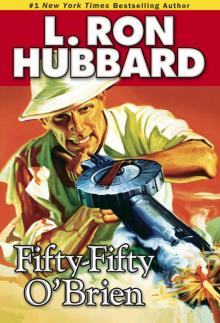 Fifty-Fifty O'Brien
Fifty-Fifty O'Brien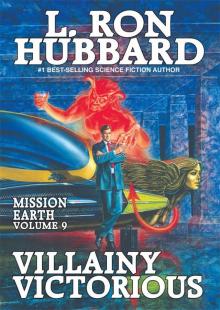 Villainy Victorious
Villainy Victorious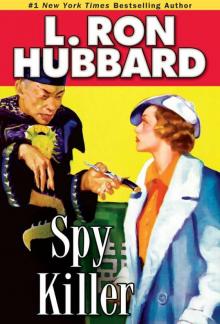 Spy Killer
Spy Killer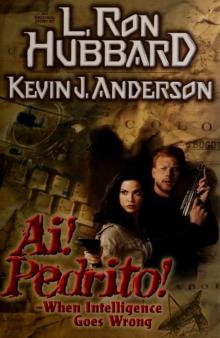 Ai! Pedrito!: When Intelligence Goes Wrong
Ai! Pedrito!: When Intelligence Goes Wrong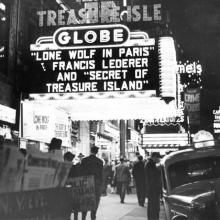 The Dangerous Dimension
The Dangerous Dimension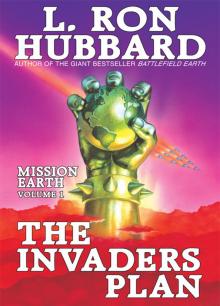 Mission Earth Volume 1: The Invaders Plan
Mission Earth Volume 1: The Invaders Plan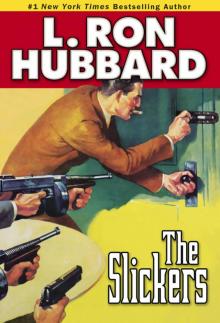 The Slickers
The Slickers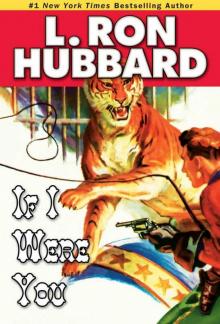 If I Were You
If I Were You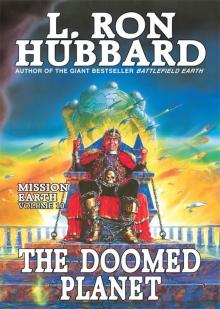 The Doomed Planet
The Doomed Planet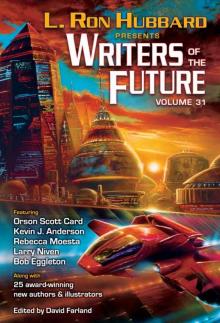 Writers of the Future Volume 31
Writers of the Future Volume 31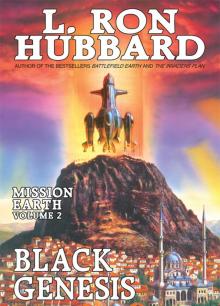 Mission Earth Volume 2: Black Genesis
Mission Earth Volume 2: Black Genesis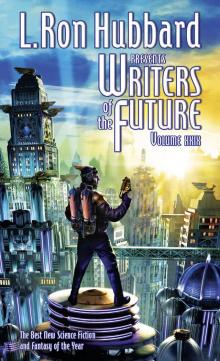 Writers of the Future: 29
Writers of the Future: 29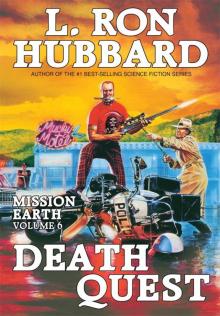 Death Quest
Death Quest The Enemy Within
The Enemy Within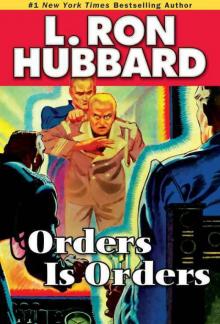 Orders Is Orders
Orders Is Orders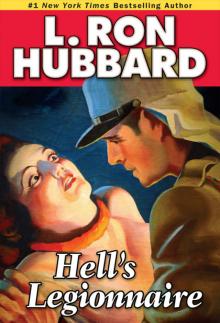 Hell's Legionnaire
Hell's Legionnaire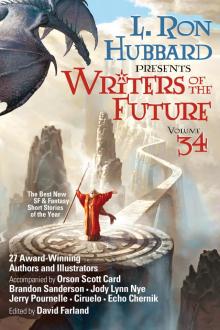 L. Ron Hubbard Presents Writers of the Future 34
L. Ron Hubbard Presents Writers of the Future 34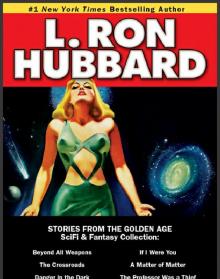 The Scifi & Fantasy Collection
The Scifi & Fantasy Collection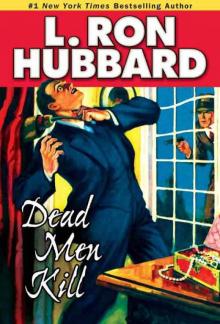 Dead Men Kill
Dead Men Kill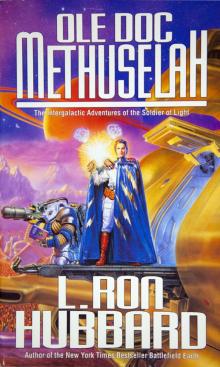 Ole Doc Methuselah: The Intergalactic Adventures of the Soldier of Light
Ole Doc Methuselah: The Intergalactic Adventures of the Soldier of Light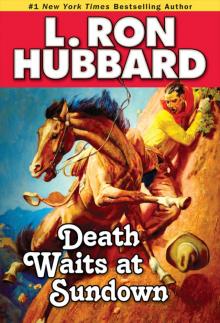 Shadows From Boot Hill
Shadows From Boot Hill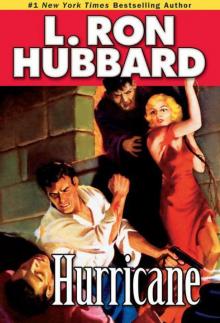 Hurricane
Hurricane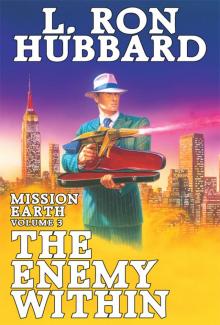 Mission Earth Volume 3: The Enemy Within
Mission Earth Volume 3: The Enemy Within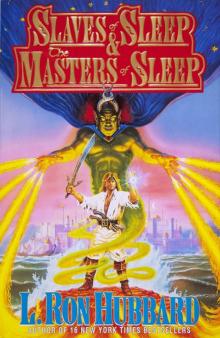 Slaves of Sleep & the Masters of Sleep
Slaves of Sleep & the Masters of Sleep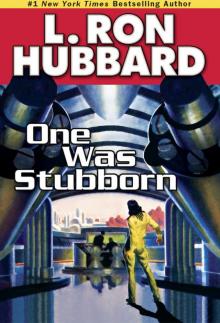 One Was Stubborn
One Was Stubborn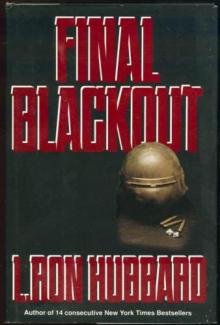 Final Blackout: A Futuristic War Novel
Final Blackout: A Futuristic War Novel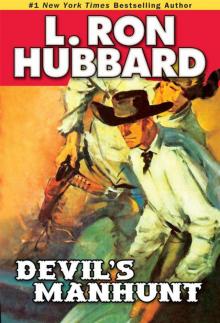 Devil's Manhunt
Devil's Manhunt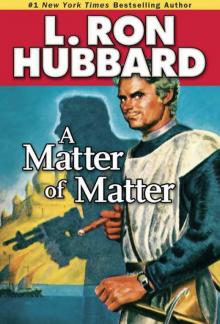 A Matter of Matter
A Matter of Matter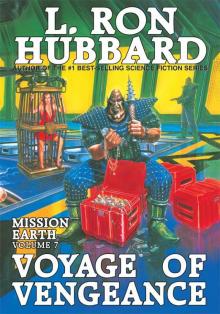 Voyage of Vengeance
Voyage of Vengeance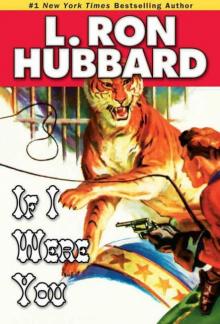 If I Were You (Science Fiction & Fantasy Short Stories Collection)
If I Were You (Science Fiction & Fantasy Short Stories Collection)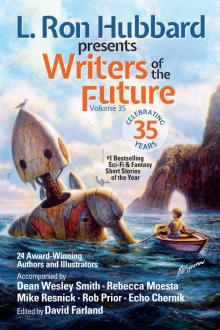 L. Ron Hubbard Presents Writers of the Future Volume 35
L. Ron Hubbard Presents Writers of the Future Volume 35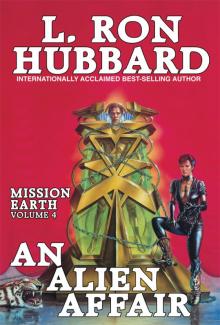 Mission Earth Volume 4: An Alien Affair
Mission Earth Volume 4: An Alien Affair Black Genesis
Black Genesis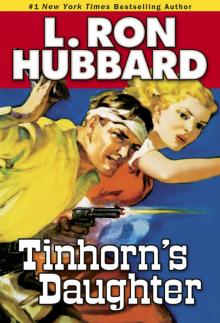 Tinhorn's Daughter
Tinhorn's Daughter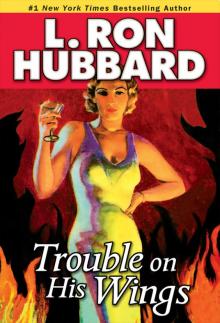 Trouble on His Wings
Trouble on His Wings Writers of the Future Volume 27: The Best New Science Fiction and Fantasy of the Year
Writers of the Future Volume 27: The Best New Science Fiction and Fantasy of the Year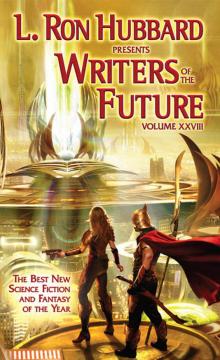 Writers of the Future Volume 28: The Best New Science Fiction and Fantasy of the Year
Writers of the Future Volume 28: The Best New Science Fiction and Fantasy of the Year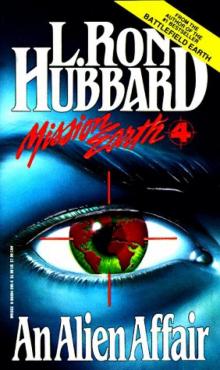 An Alien Affair
An Alien Affair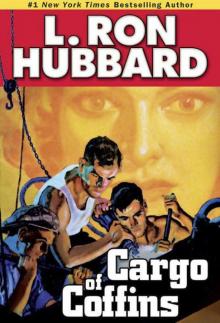 Cargo of Coffins
Cargo of Coffins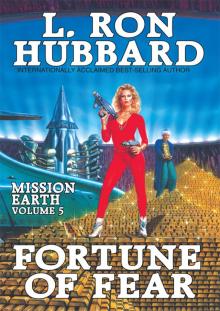 Mission Earth Volume 5: Fortune of Fear
Mission Earth Volume 5: Fortune of Fear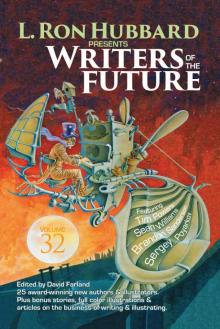 Writers of the Future 32 Science Fiction & Fantasy Anthology
Writers of the Future 32 Science Fiction & Fantasy Anthology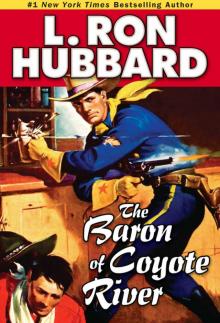 The Baron of Coyote River
The Baron of Coyote River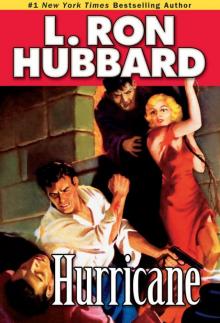 Hurricane (Stories From the Golden Age)
Hurricane (Stories From the Golden Age)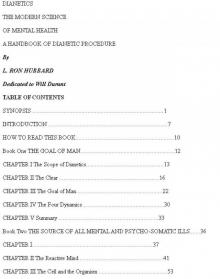 Dianetics: The Modern Science of Mental Health
Dianetics: The Modern Science of Mental Health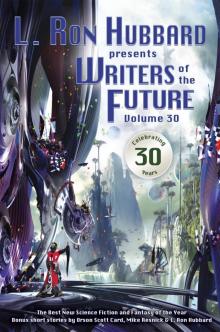 Writers of the Future, Volume 30
Writers of the Future, Volume 30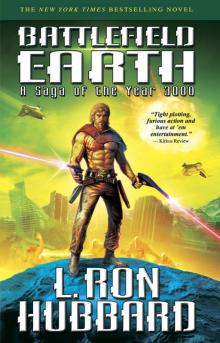 Battlefield Earth: A Saga of the Year 3000
Battlefield Earth: A Saga of the Year 3000 Fear
Fear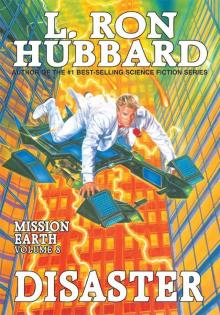 Disaster
Disaster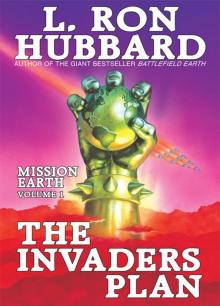 Invaders Plan, The: Mission Earth Volume 1
Invaders Plan, The: Mission Earth Volume 1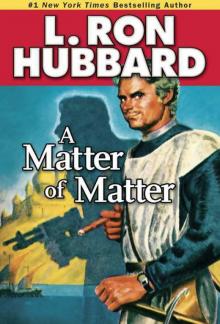 A Matter of Matter (Stories from the Golden Age)
A Matter of Matter (Stories from the Golden Age)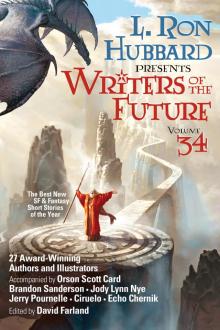 Writers of the Future Volume 34
Writers of the Future Volume 34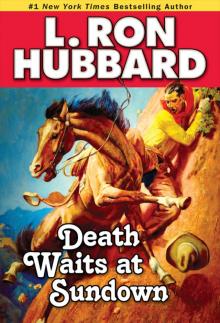 Death Waits at Sundown
Death Waits at Sundown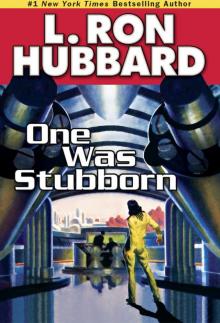 One Was Stubbron
One Was Stubbron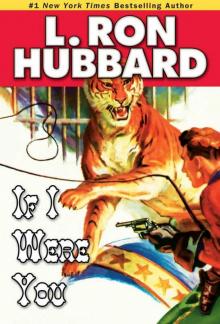 If I Were You (Stories from the Golden Age)
If I Were You (Stories from the Golden Age)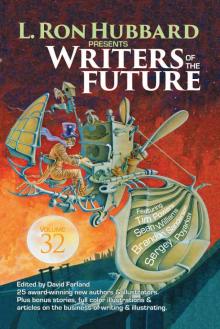 Writers of the Future 32 Science Fiction & Fantasy Anthology (L. Ron Hubbard Presents Writers of the Future)
Writers of the Future 32 Science Fiction & Fantasy Anthology (L. Ron Hubbard Presents Writers of the Future)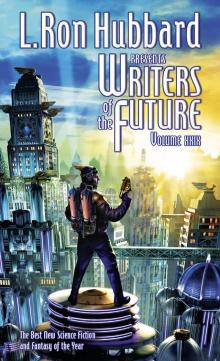 Writers of the Future, Volume 29
Writers of the Future, Volume 29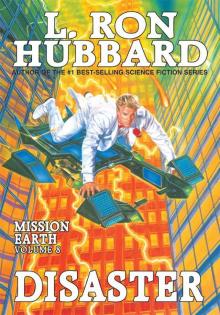 Mission Earth Volume 8: Disaster
Mission Earth Volume 8: Disaster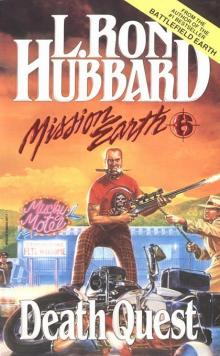 Mission Earth 6: Death Quest
Mission Earth 6: Death Quest Writers of the Future, Volume 27
Writers of the Future, Volume 27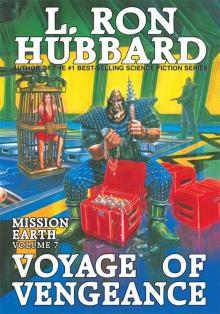 Mission Earth Volume 7: Voyage of Vengeance
Mission Earth Volume 7: Voyage of Vengeance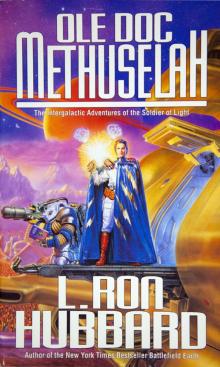 Ole Doc Methuselah
Ole Doc Methuselah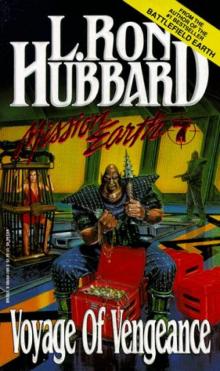 Mission Earth 07: Voyage of Vengeance
Mission Earth 07: Voyage of Vengeance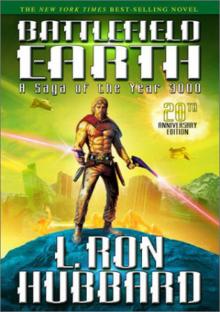 Battlefield Earth
Battlefield Earth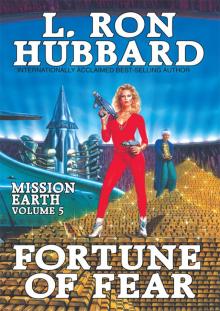 Fortune of Fear
Fortune of Fear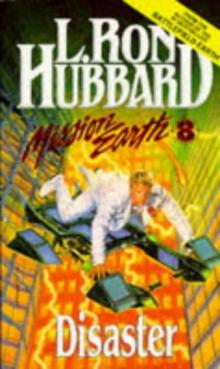 Mission Earth 8: Disaster
Mission Earth 8: Disaster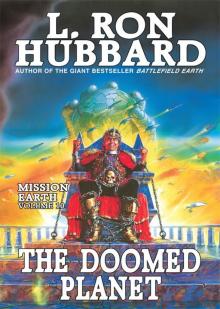 Mission Earth Volume 10: The Doomed Planet
Mission Earth Volume 10: The Doomed Planet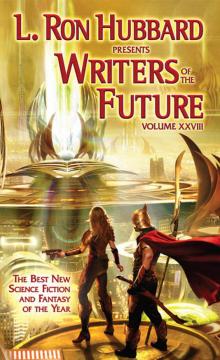 Writers of the Future, Volume 28
Writers of the Future, Volume 28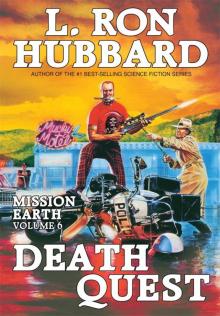 Mission Earth Volume 6: Death Quest
Mission Earth Volume 6: Death Quest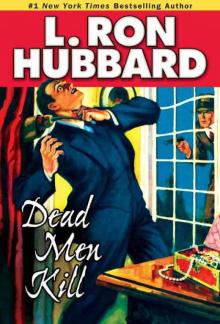 Dead Men Kill (Stories from the Golden Age)
Dead Men Kill (Stories from the Golden Age)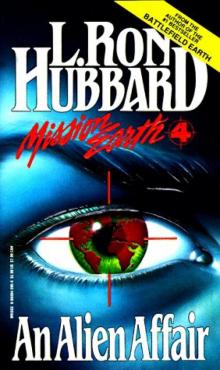 Mission Earth 4: An Alien Affair
Mission Earth 4: An Alien Affair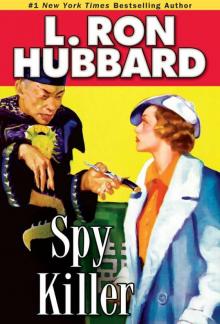 Spy Killer (Stories from the Golden Age)
Spy Killer (Stories from the Golden Age)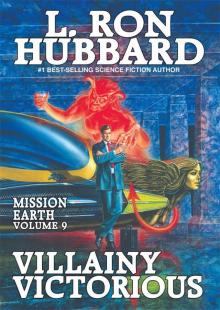 Mission Earth Volume 9: Villainy Victorious
Mission Earth Volume 9: Villainy Victorious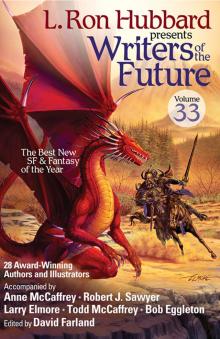 L. Ron Hubbard Presents Writers of the Future, Volume 33
L. Ron Hubbard Presents Writers of the Future, Volume 33